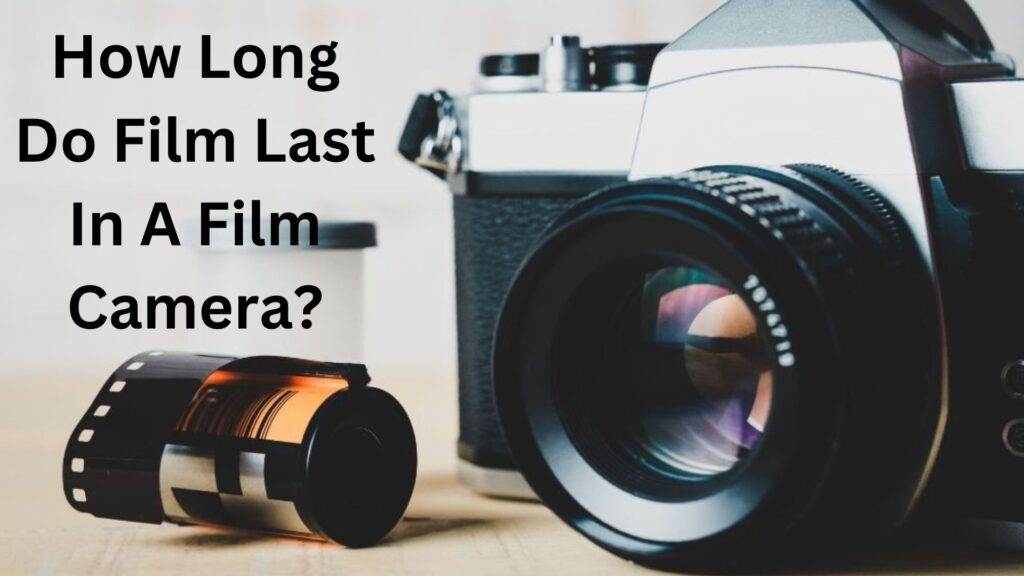Film photography holds a certain charm and nostalgia that digital cameras can’t quite replace. Whether you’re a seasoned film photographer or someone just starting out, you’ve probably wondered: How long does film last in a camera?
In this article, we’ll dive deep into how long film can stay in your camera, what factors influence its lifespan, and the best practices for preserving film quality.
How Long Do Film Last In A Film Camera?
How long you can leave film in a camera depends on various factors. In general, film is meant to be used within a certain time frame, but it can last quite a while if stored properly.
Typically, you should use film within 10-15 years after placing it in the camera.
Beyond that, the quality starts to degrade, and you might see some odd discolorations, graininess, or loss of detail in the final images. However, under perfect conditions, some films can last even longer in a camera.

Tips Storing Film for Maximum Longevity
1. Keep It Cool: Store your film in a refrigerator or a cool, dark place. Avoid places with high humidity, as moisture can damage the film.
2. Avoid Light Exposure: Always keep your film in its original packaging or a dark container until you’re ready to use it. Light can fog the film, ruining your images.
3. Check Expiration Dates: Always check the expiration date on your film. While expired film can sometimes yield interesting results, it may also lead to unpredictable outcomes.
4. Use Airtight Containers: For long-term storage, consider using airtight containers to protect against humidity and light.
How Long Is 35mm Film Good For?
35mm film can last for many years if stored properly, but its longevity depends on several factors, including the type of film, storage conditions, and exposure to heat, humidity, and light.
Generally, color negative film can retain its quality for around 1 to 3 years. To maximize its lifespan, store film in a cool, dry place, ideally in a refrigerator or freezer, and keep it away from direct sunlight.
Regularly checking for signs of degradation, such as color fading or emulsion damage, is also advisable.
Does Camera Film Degrade Over Time?
Camera film can degrade over time due to various factors. Exposure to light, heat, humidity, and improper storage conditions can lead to fading, color shifts, and loss of detail. The chemical compounds in the film can also break down, resulting in a decrease in image quality.
Color negative film tends to degrade faster, often losing color vibrancy and detail over 10 to 20 years, while black-and-white film generally has a longer lifespan, potentially lasting 50 years or more if stored properly.
Environmental conditions play a significant role; for example, high temperatures and humidity can accelerate degradation.
What Is The Lifespan Of Film?
The lifespan of film varies depending on its type and storage conditions. Generally, color negative film lasts about 20 to 30 years, while color reversal (slide) film may have a similar or slightly longer lifespan.
Optimal storage in a cool, dry, and dark environment is crucial for preserving film quality, as exposure to heat, humidity, and light can significantly accelerate degradation.
(FAQs) About How Long Film Lasts In A Film Camera:
How long can unexposed film last in a camera?
Unexposed film can last for several years if stored properly in a cool, dry place. Typically, color negative film is best used within 2 to 3 years, while black and white film can last up to 5 years or more.
What factors affect the lifespan of film in a camera?
The lifespan of film is influenced by storage conditions, including temperature, humidity, and exposure to light. High heat and moisture can degrade film quality more quickly.
How long should I wait to develop exposed film?
It’s best to develop exposed film as soon as possible. For color negative film, aim to develop within 2 weeks. Black and white film can be developed later, but within a month is ideal for the best quality.
Does the type of camera affect film longevity?
Yes, the type of camera can impact film longevity. Leaving film loaded in a camera exposed to heat or humidity for long periods can decrease its lifespan and quality.
How can I preserve developed film?
To preserve developed film, store negatives and prints in a cool, dark place. Use acid-free archival sleeves and keep prints flat to prevent damage. Avoid direct sunlight to maintain their quality over time.
Conclusion
Knowing how long film lasts in a film camera is vital for anyone passionate about photography. By paying attention to the type of film, ensuring proper storage conditions, and developing it promptly, I can significantly enhance the longevity and quality of my images.
Each type of film has its own lifespan, and being mindful of these details helps me capture moments that stand the test of time.
Embracing film photography is a rewarding journey, and with the right care, I can enjoy the magic it offers for years to come. Happy shooting, and may your film adventures be filled with creativity!
- How to Get Water Out of AirPods? Here’s Solution - November 21, 2024
- Are AirTags Worth It? – [Depends on You] - November 21, 2024
- How to Replace a Lost AirPod? - November 21, 2024
